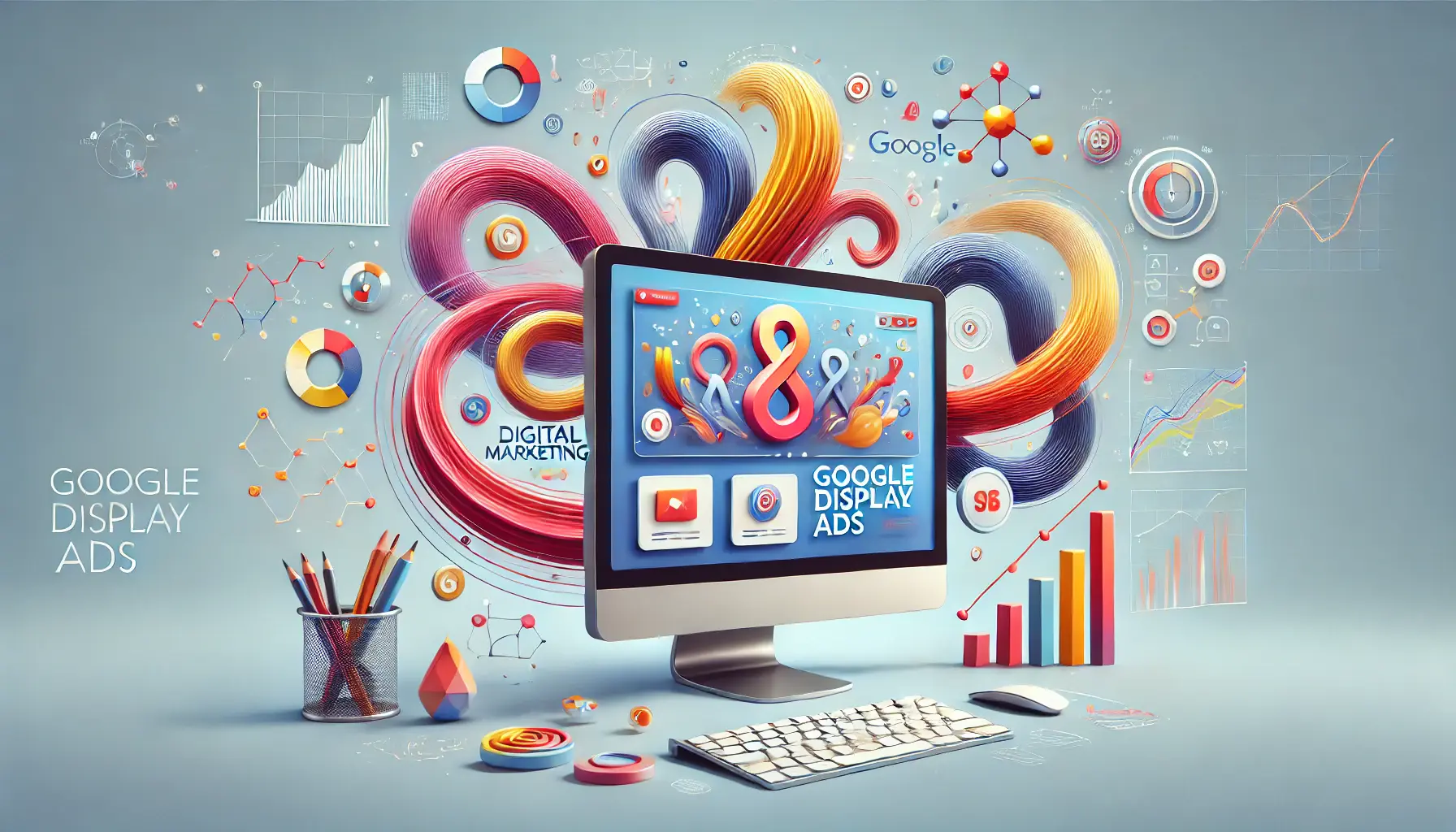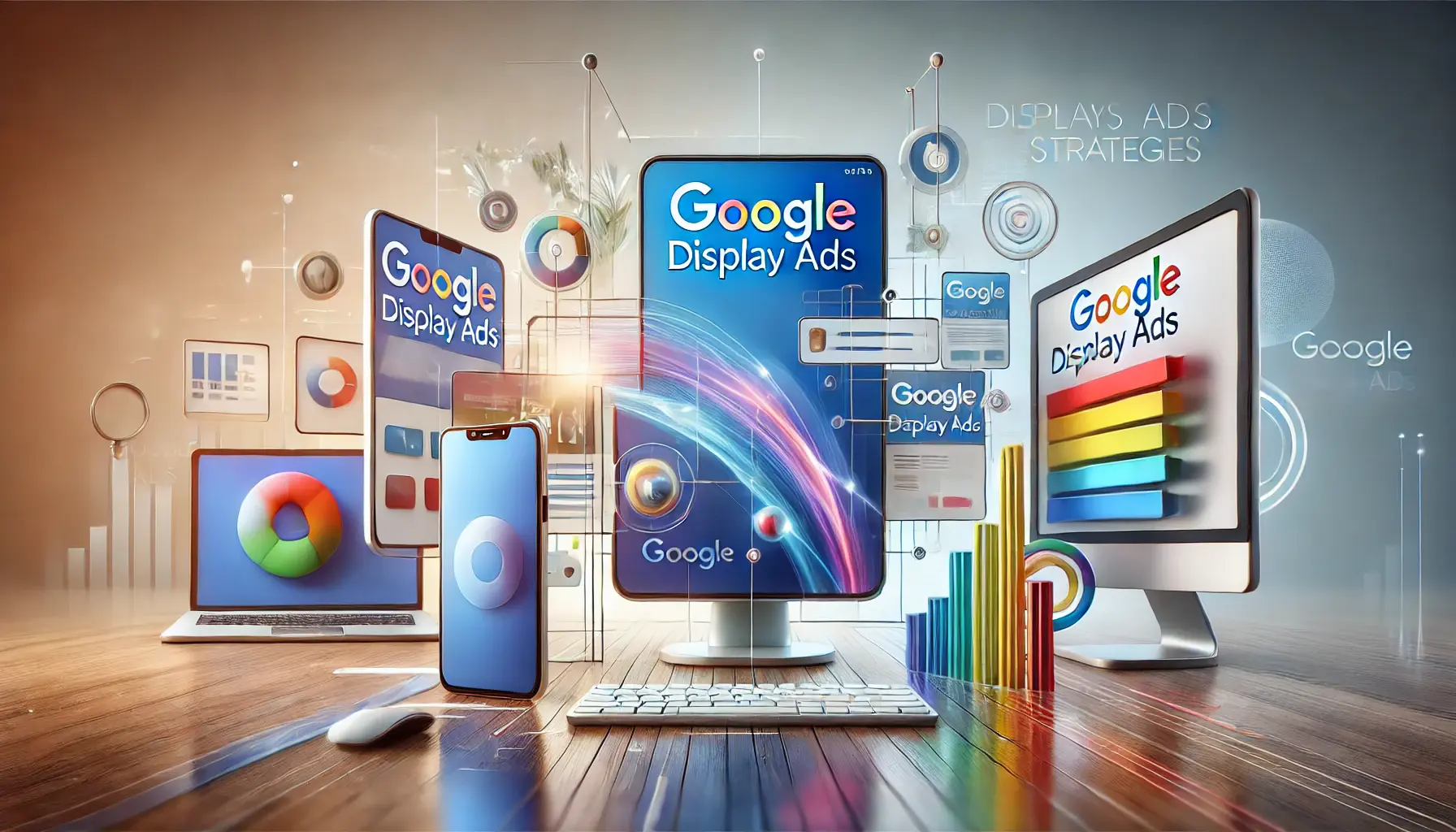In digital marketing, one of the best ways to maximize reach and impact is by creating powerful content synergies with Google Display Ads.
A powerful combination like this allows for seamless integration of your content strategies with visually appealing ads that make your brand message resonate with your audience across platforms.
Whether you are a marketer looking to enhance your campaigns or a business owner aspiring for more engagement, knowing how to create content synergyThe interaction of elements that produce a combined effect greater than the sum of their individual effects. will elevate your advertising to the next level.
In this article, we will explore actionable and creative ideas to effectively merge content with Google Display Ads.
You’ll learn how to capture attention, build trust, and drive results by diving into strategies that leverage this powerful advertising tool.
Let’s begin by understanding the concept of content synergy and its role in digital marketing success.
- Understanding Content Synergy with Google Display Ads
- Unleashing the Power of Visual Storytelling in Display Ads
- Building Cross-Platform Strategies for Content Synergy
- Creating Engaging Interactive Ad Formats
- Measuring the Success of Content Synergy Efforts
- How to Be Successful with Content Synergy and Google Display Ads Combined
- Content Synergy and Google Display Ads: Frequently Asked Questions
Understanding Content Synergy with Google Display Ads
At its core, content synergy refers to the harmonious collaboration between different marketing elements to create a unified and compelling message.
In the context of Google Display Ads, it’s about aligning your display ad visuals, copy, and targeting strategies with your broader content marketing goals.
When done effectively, this synergy amplifies your brand’s voice, making your ads more impactful and your content more engaging.

Visual representation of the concept of content synergy in digital marketing.
What is Content Synergy and Why It Matters?
Content synergy ensures that your audience receives a consistent message across all touchpoints.
Imagine seeing a Google Display Ad promoting a product and later finding a blog post or social media update echoing the same message.
This consistency builds trust, reinforces your brand’s identity, and encourages users to take action.
Google Display Ads are particularly effective for this because they provide a visual platform for projecting your content.
With millions of websites and apps in their network, you can target your audience where they spend most of their time online.
This makes it easier to create touchpoints that resonate and drive conversions.
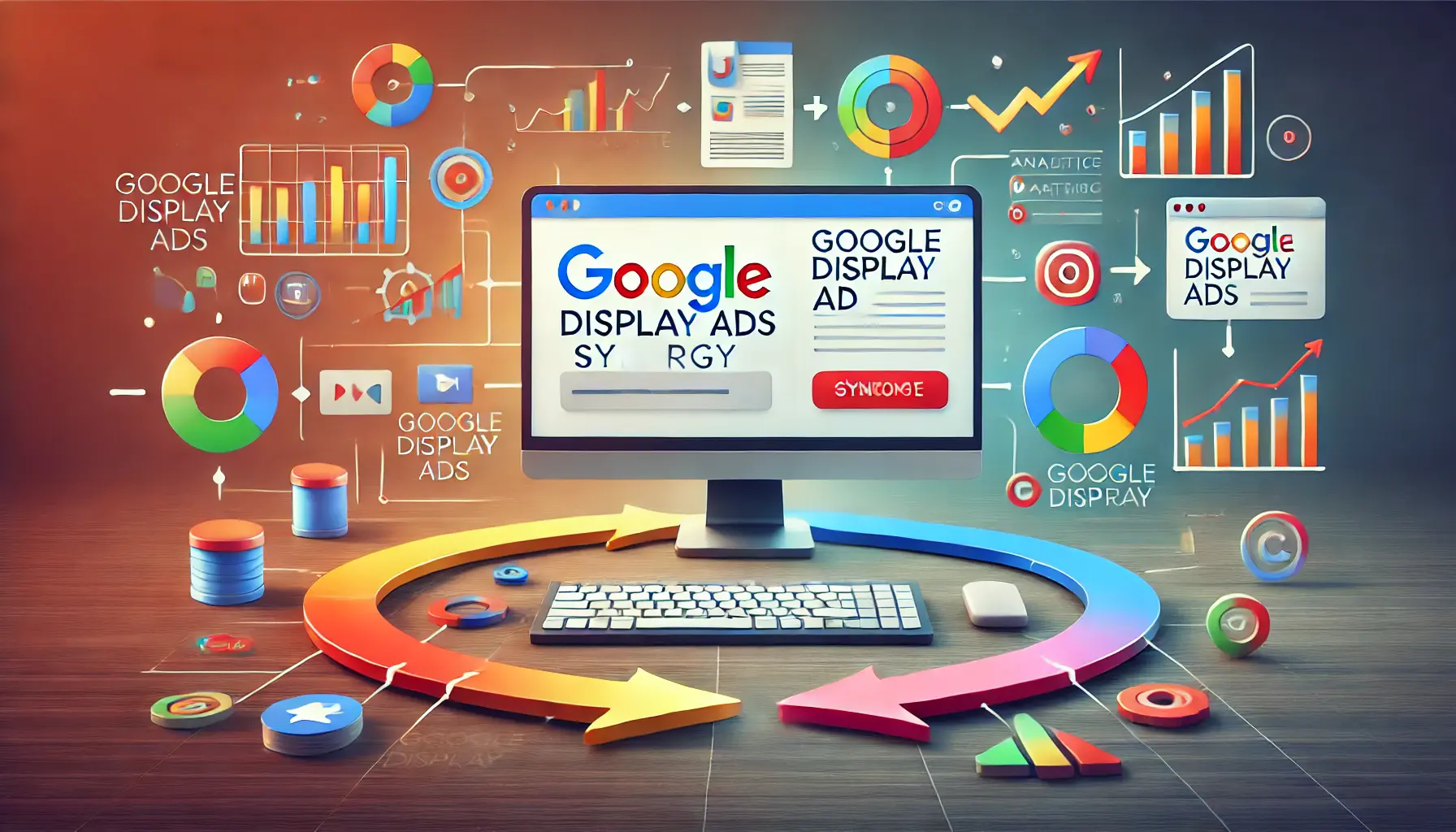
Visual representation of how Google Display Ads contribute to content synergy in digital marketing.
The Role of Google Display Ads in Creating Synergy
Google Display Ads act as a bridge between your content and your audience.
By using targeted visuals, compelling headlines, and strategic placements, these ads can grab attention and guide users toward deeper engagement with your content.
For example:
- Retargeting Campaigns: Use display ads to bring back visitors who have engaged with your content but didn’t convert.
- Content Promotion: Showcase your blog posts, videos, or other content assets through visually appealing ads.
- Brand Awareness: Leverage display ads to introduce your content and brand to new audiences.
By integrating Google Display Ads into your content strategy, you ensure your message remains at the forefront of your audience’s minds, creating a seamless journey from awareness to action.
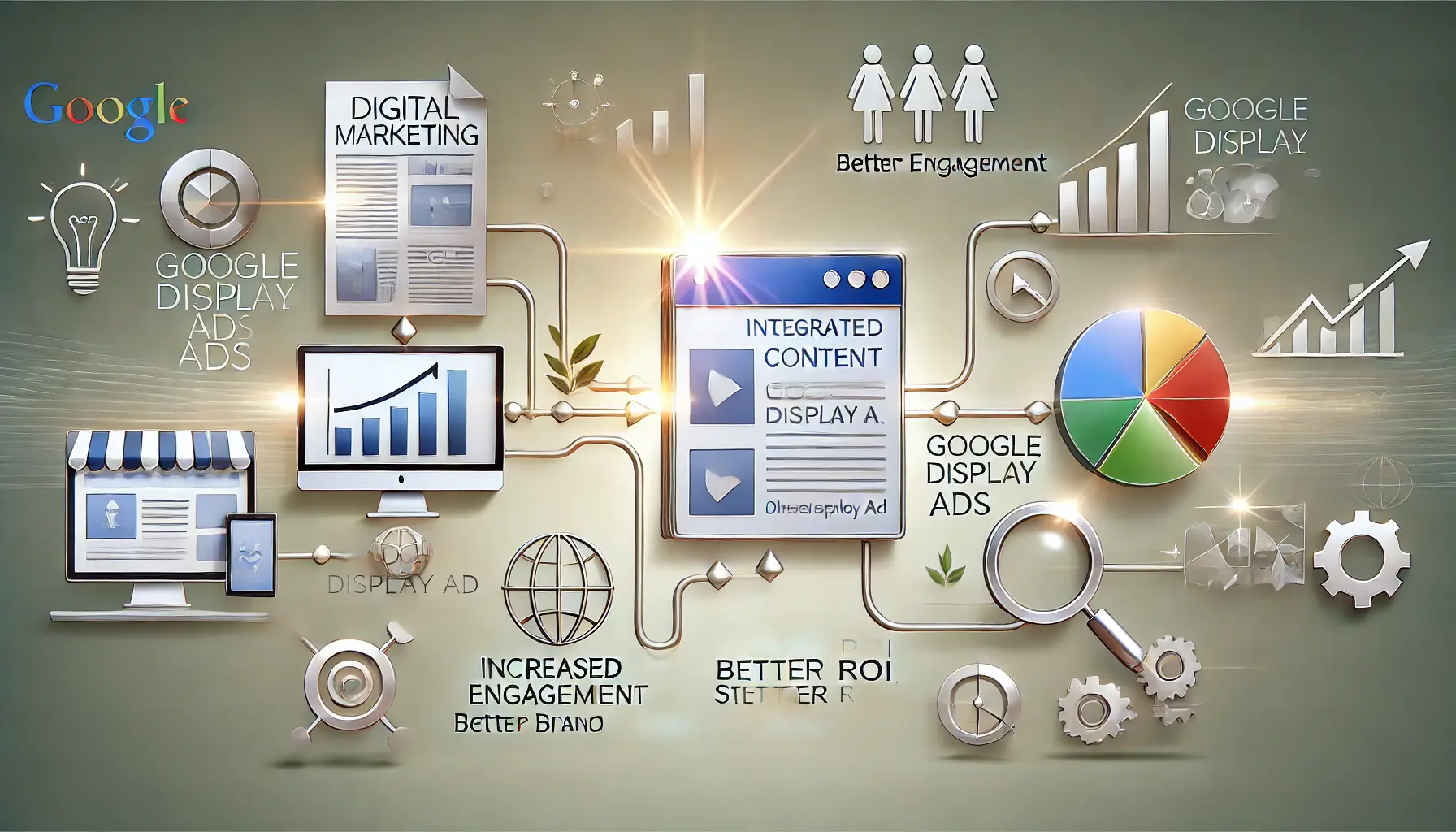
Visual representation of the benefits of integrating content with Google Display Ads for better engagement and ROI.
Benefits of Integrating Content with Display Ads
The synergy between content and display ads offers numerous advantages:
- Enhanced Engagement: A cohesive message keeps users engaged, increasing the likelihood of clicks and conversions.
- Better ROI: By aligning your content and ads, you maximize the value of both efforts.
- Stronger Brand Recognition: Consistency across platforms helps establish a recognizable and trustworthy brand identity.
- Improved Targeting: With Google’s advanced targeting options, you can ensure your ads reach the right audience at the right time.
Now that you understand the importance of content synergy and its benefits, we’ll move on to actionable ideas for leveraging visual storytelling in Google Display Ads.
Content synergy amplifies your brand’s voice by harmonizing your display ads with broader content strategies, ensuring a cohesive and impactful message.

Illustration showing the dynamic impact of visual storytelling in Google Display Ads.
Unleashing the Power of Visual Storytelling in Display Ads
Visual storytelling is one surefire way to create engaging Google Display Ads.
By telling a story through visuals, you can appeal emotionally to your audience and make your brand stick in their minds.
In today’s sea of digital noise, captivating visuals help your ads grab attention and foster meaningful interactions with your brand.

Illustration of the creative process behind crafting engaging visual narratives for display ads.
Crafting Engaging Visual Narratives
The recipe for effective visual storytelling begins with creating a narrative that connects with the core of your brand’s message.
Use imagery, colors, and typography that accurately represent your brand’s persona and resonate with your target audience.
For instance:
- Showcase Real-Life Scenarios: Use imagery that represents relatable situations where your product or service is the solution.
- Leverage Emotions: Incorporate visuals that evoke joy, trust, or excitement to connect with your audience on a deeper level.
- Highlight Unique Selling Points: Use visual elements to emphasize what sets your brand apart from competitors.
Remember, the story you tell should be simple yet powerful enough to capture attention within seconds.

Illustration showing dynamic ads adjusting based on user behavior to maximize impact in digital marketing.
Using Dynamic Ads for Maximum Impact
Dynamic ads take visual storytelling to the next level by personalizing the content based on user behavior.
These ads automatically adjust to show products or services relevant to the viewer, increasing the likelihood of engagement.
Some tips for using dynamic adsAds that automatically adapt content based on user data or behavior to increase engagement. effectively include:
- Utilize Retargeting: Show ads that reflect the products users have previously viewed on your site.
- Personalize Recommendations: Use algorithms to suggest products or services that align with users’ preferences.
- Test Multiple Variations: Experiment with different ad designs and messaging to see what resonates most with your audience.
Dynamic ads not only enhance the user experience but also increase the return on investment by catering to individual preferences.
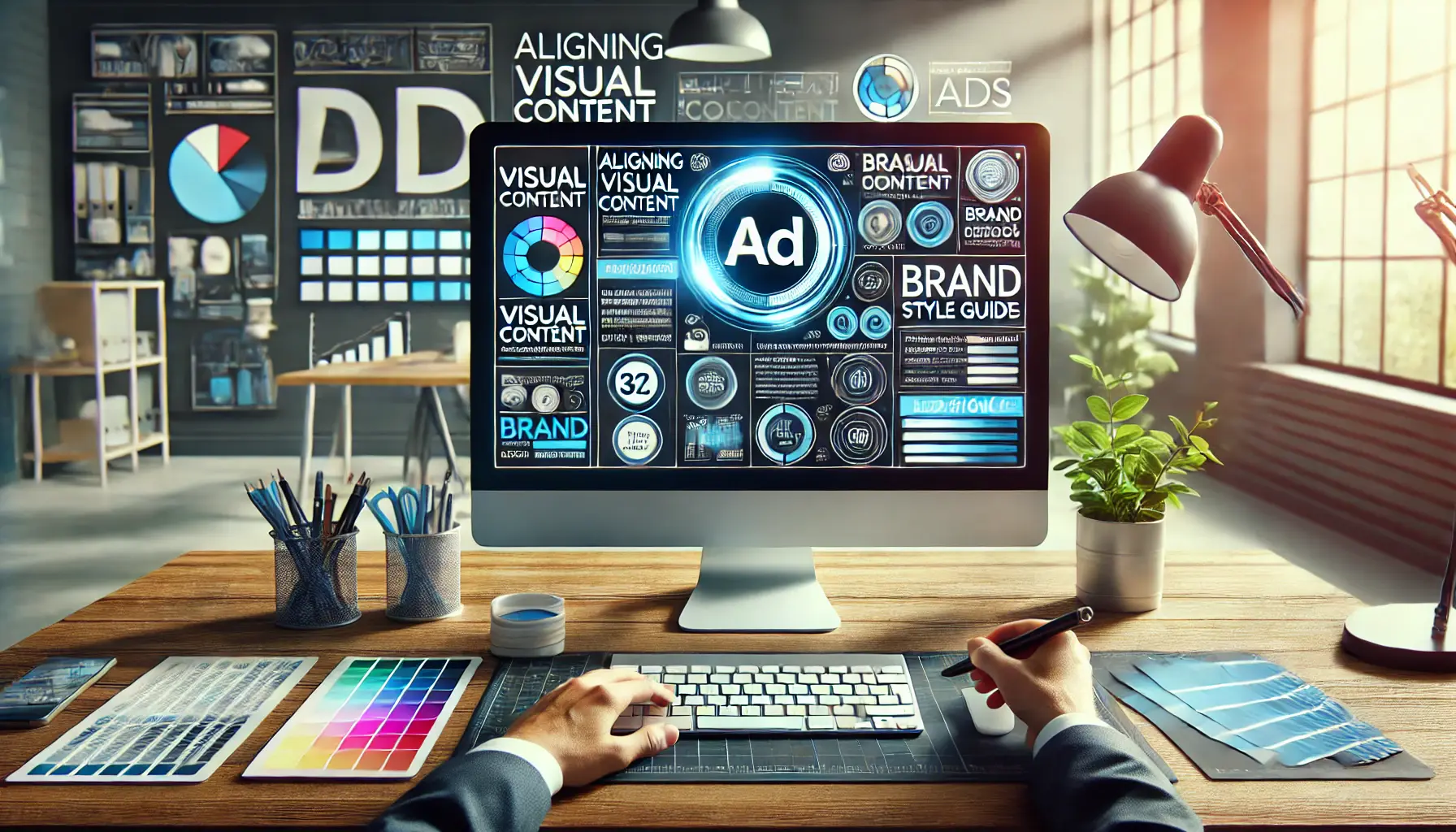
Illustration of aligning visual content with brand messaging through design tools and consistency.
Tips for Aligning Visual Content with Brand Messaging
Consistency is critical when integrating visual storytelling into your display ads.
Ensure your visuals align with your overall brand messaging and content strategy.
Here’s how you can achieve this:
- Adhere to a Brand Style Guide: Utilize your brand colors, fonts, and imagery in ads.
- Brand It with Your Logo: Make every ad instantly recognizable by including your logo on each.
- Prioritize Quality: High-resolution images and professional designs convey credibility and drive more clicks.
- Tell a Unified Story: Ensure the imagery in your display ads complements other marketing materials, creating a cohesive message.
With a little creativity, leveraging the power of visual storytelling can make your Google Display Ads memorable, driving user attention and conversions.
Next, we’ll dive into building cross-platform strategies to amplify your content synergy further.
Visual storytelling captures attention, fosters emotional connections, and makes your Google Display Ads memorable in a cluttered digital landscape.
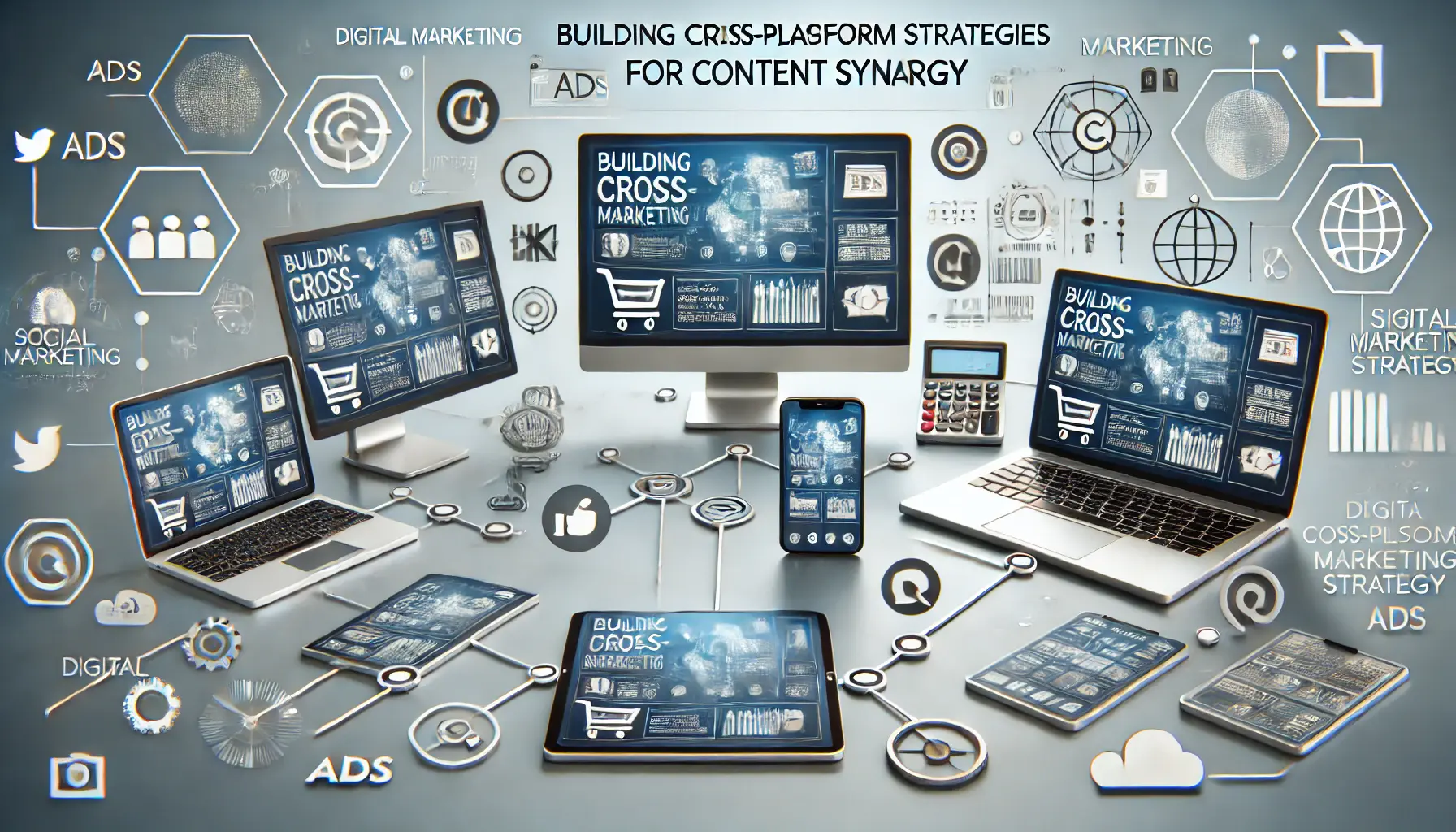
Visual representation of building cross-platform strategies for content synergy in digital marketing.
Building Cross-Platform Strategies for Content Synergy
The real value of your Google Display Ads can be achieved by embedding them in a cross-platform strategy.
By connecting your advertising efforts across several channels, you can provide your audience with a seamless experience and ensure consistent messaging for better engagement.
Let’s explore how you can build effective cross-platform strategies to enhance content synergy.

Visual representation of integrating Google Display Ads with social media campaigns for seamless cross-platform marketing.
Connecting Google Display Ads with Social Media Campaigns
Social media platforms are a natural extension of your Google Display Ads.
By aligning your ad visuals, messaging, and targeting strategies across platforms, you can create a unified brand presence.
Here’s how to connect the two effectively:
- Use Similar Visuals: Repurpose display ad creatives for social media to maintain consistency.
- Retarget Users: Leverage social media ads to retarget users who have interacted with your Google Display Ads.
- Promote Content Synergistically: Share the same blog posts, videos, or promotional materials featured in your Google Display Ads.
This integration helps reinforce your message and keeps your brand top-of-mind for your audience.
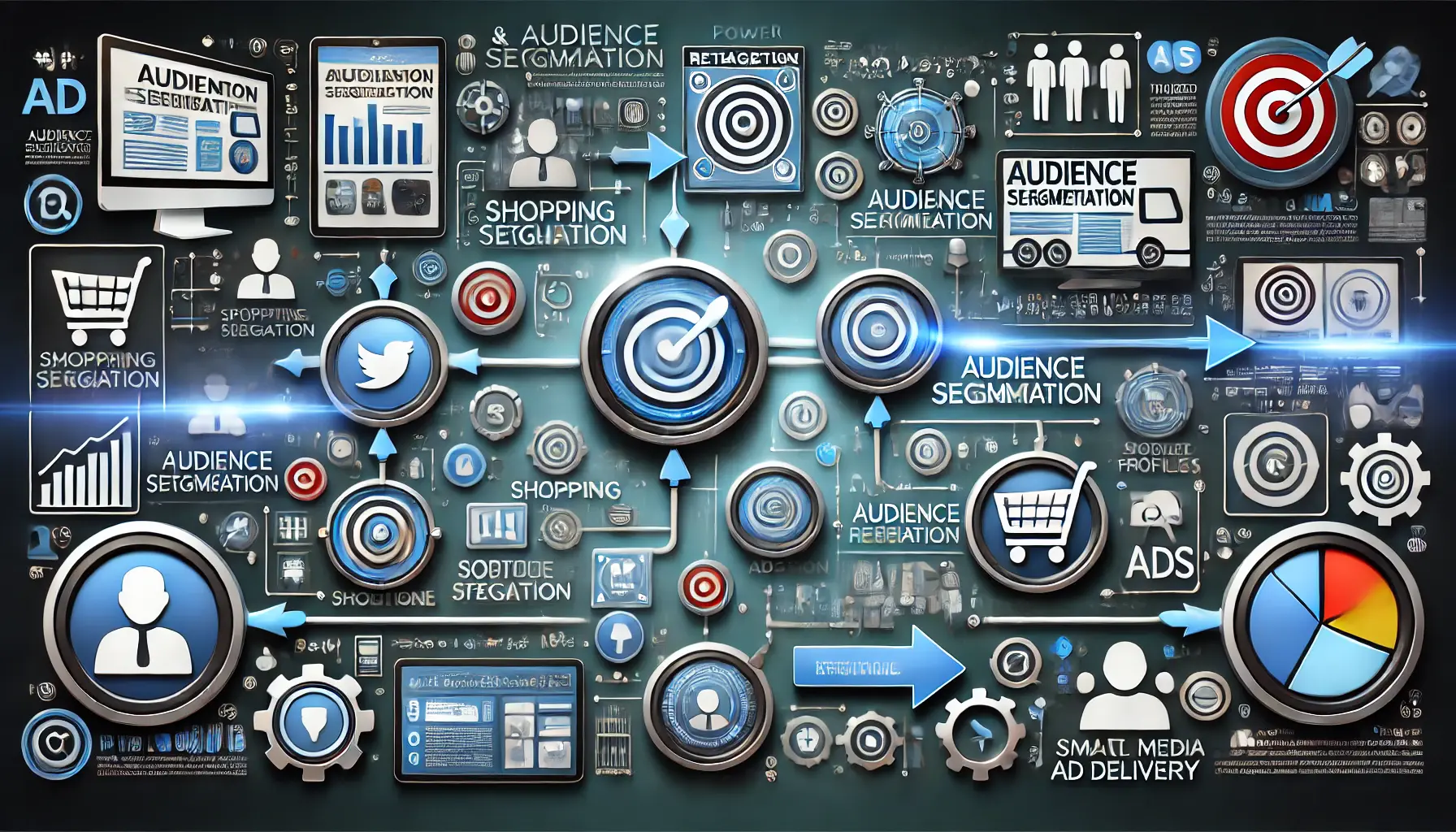
Visual representation of the power of retargeting and audience segmentation in digital marketing.
The Power of Retargeting and Audience Segmentation
Retargeting is a powerful tactic to re-engage users who have previously interacted with your brand.
It becomes even more effective when combined with audience segmentation.
Here’s how to leverage these strategies:
- Segment Your Audience: Create tailored ads for different user groups based on their preferences, behavior, and engagement history.
- Cross-Platform Retargeting: Use Google Display Ads to retarget users who visited your website, and follow up with personalized offers on social media or email.
- Dynamic Ad Content: Utilize dynamic ads to display products or services that match the user’s interests.
These strategies ensure that your ads remain relevant and engaging, improving conversion rates across platforms.

Visual representation of integrating SEO with Google Display Ads for enhanced reach in digital marketing.
Integrating SEO and Display Ads for Maximum Reach
Search engine optimization (SEO) and Google Display Ads work hand in hand to amplify your content’s visibility.
By integrating these two, you can reach your target audience more effectively.
Here’s how it works:
- Target High-Intent Keywords: Use SEO data to determine the best-performing keywords and incorporate them into your ad copy.
- Advertise Optimized Content: Include SEO-optimized blog posts or landing pages in your display ads.
- Send Traffic to Important Pages: Use Google Display Ads to direct users to pages that are already ranking in search results, boosting their performance.
This integration creates a cycle where SEO supports your ad campaigns, while your ads improve the visibility of your optimized content.
By building connected strategies across platforms, merging Google Display Ads with social media, retargetingA digital marketing strategy that involves re-engaging users who have previously interacted with a website or ad., and SEO, you can create holistic and impactful advertising efforts.
Next, we’ll dive into the details of creating engaging interactive ad formats to take your campaigns to the next level.
- Connect Google Display Ads with social media for consistent branding.
- Leverage SEO insights to boost ad targeting and conversions.
- Use retargeting to reinforce messaging across platforms.
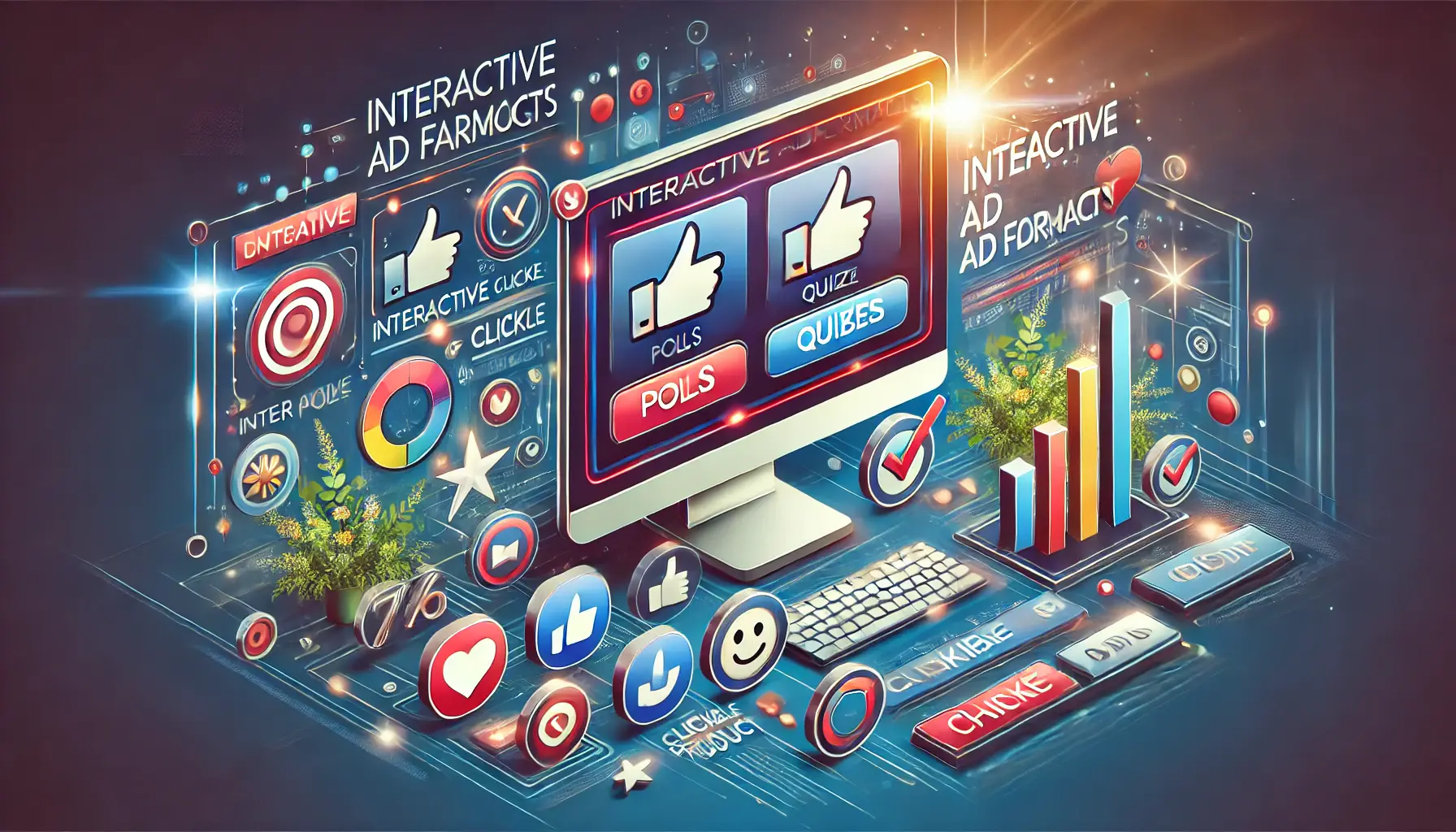
Illustration of creating engaging interactive ad formats with dynamic elements like polls and clickable images.
Creating Engaging Interactive Ad Formats
Interactive ad formats revolutionize the way brands connect with their audiences.
Unlike traditional static ads, interactive ads encourage users to engage, resulting in higher retention of your brand message and stronger connections.
By incorporating interactive elements into your Google Display Ads, you can make your campaigns more dynamic, memorable, and effective.

Illustration of interactive ads driving higher user engagement through dynamic and responsive elements.
Interactive Ads for Higher User Engagement
Interactive ads are designed to captivate audiences by offering experiences that go beyond passive viewing.
Here’s how you can use interactive ads to boost engagement:
- Polls and Surveys: Include polls or surveys within your ads to gather insights and involve users in decision-making.
- Gamified Experiences: Use gamification elements like quizzes, puzzles, or mini-games to create a fun and engaging experience.
- Interactive Videos: Allow users to click on elements within a video to explore products, features, or additional content.
These approaches not only grab attention but also keep users engaged, increasing the chances of conversions.

Illustration of using rich media ads with interactive elements to enhance user experience.
Using Rich Media Ads to Enhance User Experience
Rich media ads take interactivity to the next level by combining elements like video, audio, animation, and clickable features.
These ads offer more immersive experiences compared to traditional display ads.
Consider these rich media strategies:
- Expandable Ads: Create ads that expand when users interact, revealing more content or features.
- Product Demonstrations: Use rich media to showcase product functionality through interactive demos.
- 360-Degree Views: Allow users to explore products or environments with 360-degree interactive visuals.
Rich media ads are highly effective at engaging users and driving action by providing a comprehensive and memorable brand experience.
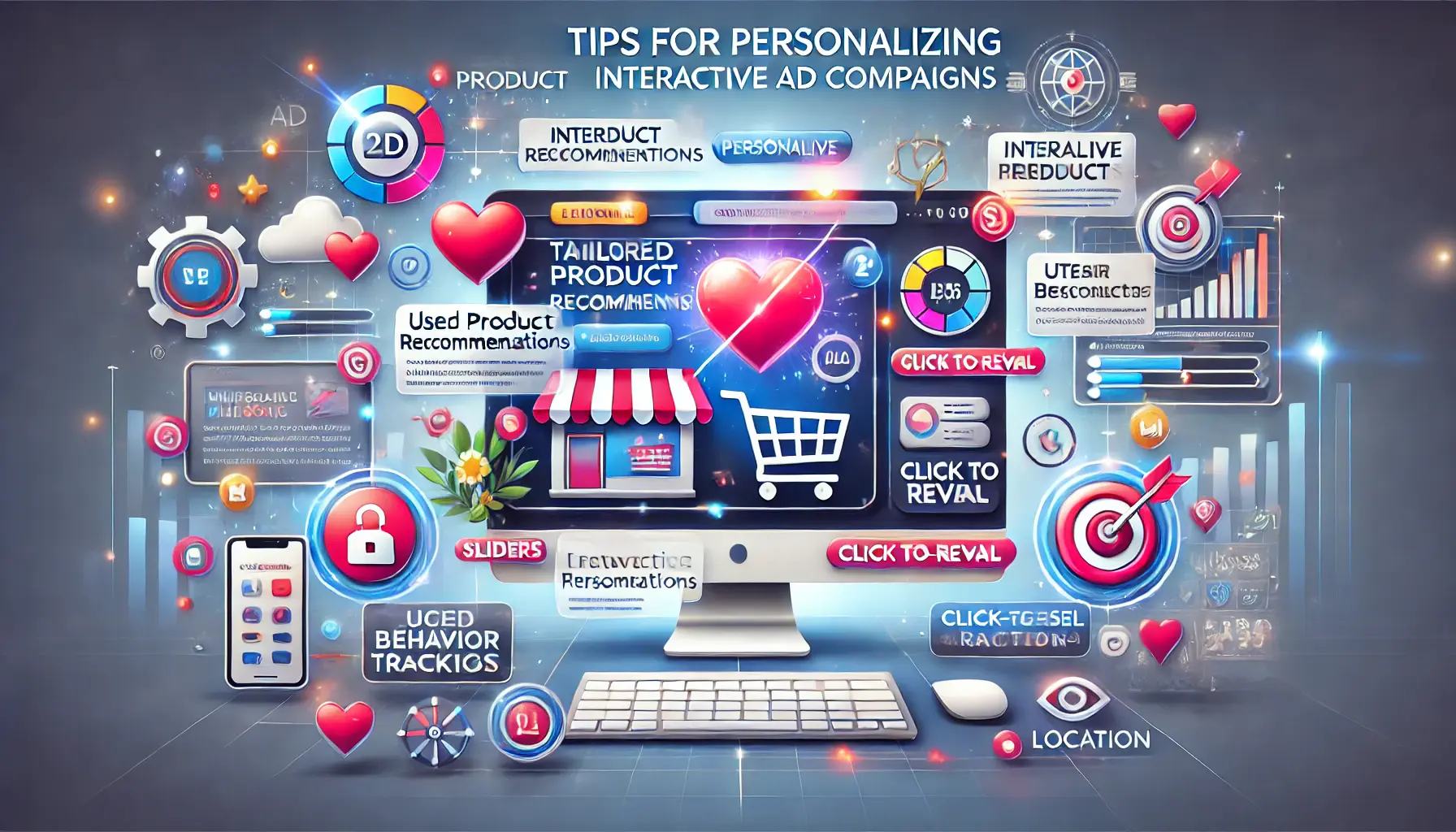
Illustration of personalizing interactive ad campaigns with dynamic, user-tailored content.
Tips for Personalizing Interactive Ad Campaigns
Personalization is key to maximizing the impact of your interactive ads.
By tailoring your campaigns to the preferences and behaviors of your audience, you make your ads more relevant and impactful.
Here are a few tips:
- Data-Driven Insights: Use analytics to understand your audience’s preferences and build personalized interactive experiences.
- Dynamic Content Personalization: Dynamically adjust ad content based on user behavior, location, or past interactions.
- Test and Optimize: Continuously test different interactive elements to identify what works best with your audience.
By blending creativity, technology, and audience insights, interactive ads can transform your Google Display Ads into powerful tools for engagement and conversion.
In the next section, we’ll explore how to measure the success of your content synergy efforts and optimize campaigns for maximum impact.
- Interactive ads like quizzes and videos enhance user retention.
- Rich media ads create immersive experiences with animations and 360-degree views.
- Personalize campaigns to connect deeply with your audience.

Illustration of measuring the success of content synergy efforts through key metrics and data analysis.
Measuring the Success of Content Synergy Efforts
Once you’ve implemented content synergy strategies in your Google Display Ads, measuring their effectiveness is critical to understanding what works and how to improve.
Success isn’t just about clicks—it’s about creating meaningful engagement, driving conversions, and enhancing your overall marketing strategy.
By focusing on key metrics and analyzing audience behavior, you can optimize your campaigns for maximum impact.

Illustration of key metrics to track for display ad campaigns, including performance data and campaign metrics.
Key Metrics to Track for Display Ad Campaigns
Tracking the right metrics is essential to evaluate the performance of your Google Display Ads.
Here are the most important metrics to monitor:
- Click-Through Rate (CTR): Measures how many people clicked on your ad relative to the number of impressions. A higher CTR indicates effective targeting and compelling content.
- Conversion Rate: Tracks the percentage of users who completed a desired action, such as signing up or making a purchase, after interacting with your ad.
- Engagement Rate: Evaluates how users are interacting with interactive ad formats, such as completing quizzes or watching videos.
- Impression Share: Shows how often your ad is displayed compared to competitors in your target market.
- Return on Ad Spend (ROAS): Calculates the revenue generated for every dollar spent on your ads, helping you understand the profitability of your campaigns.
Monitoring these metrics provides valuable insights into the performance of your ads and identifies areas for improvement.
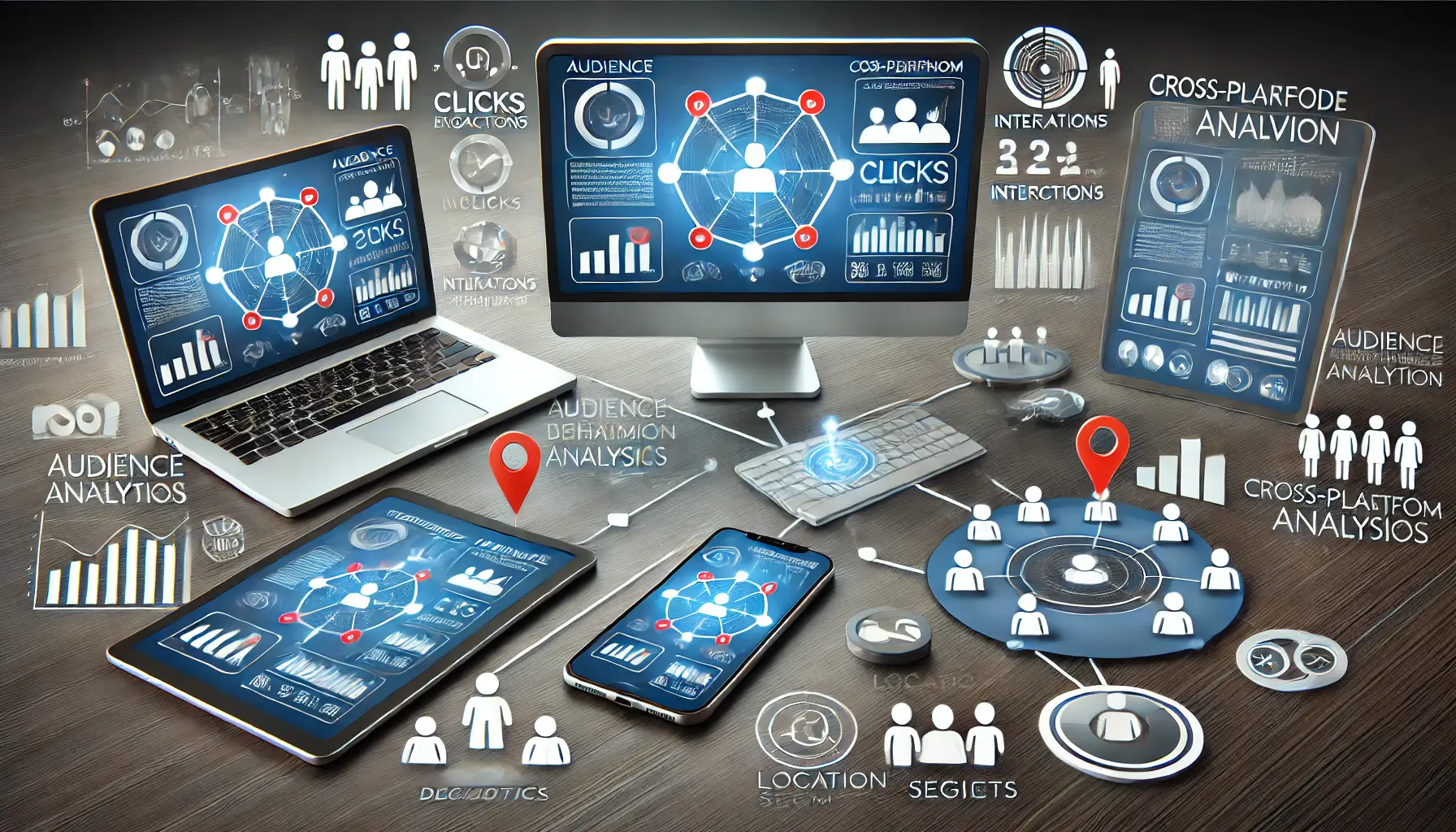
Illustration of analyzing audience behavior across platforms, with user engagement metrics on multiple devices.
Analyzing Audience Behavior Across Platforms
Understanding how your audience engages with your ads across different platforms is key to refining your content synergy efforts.
Consider these strategies:
- Track Cross-Platform Engagement: Use analytics tools to measure user interactions with your content across social media, email, and Google Display Ads.
- Analyze Demographic Data: Identify which audience segments respond best to your campaigns and tailor your strategies accordingly.
- Measure Funnel Progression: Monitor how users move through the sales funnel after engaging with your ads to identify potential drop-off points.
By analyzing these behaviors, you can make data-driven decisions to improve your campaigns and strengthen content synergy.
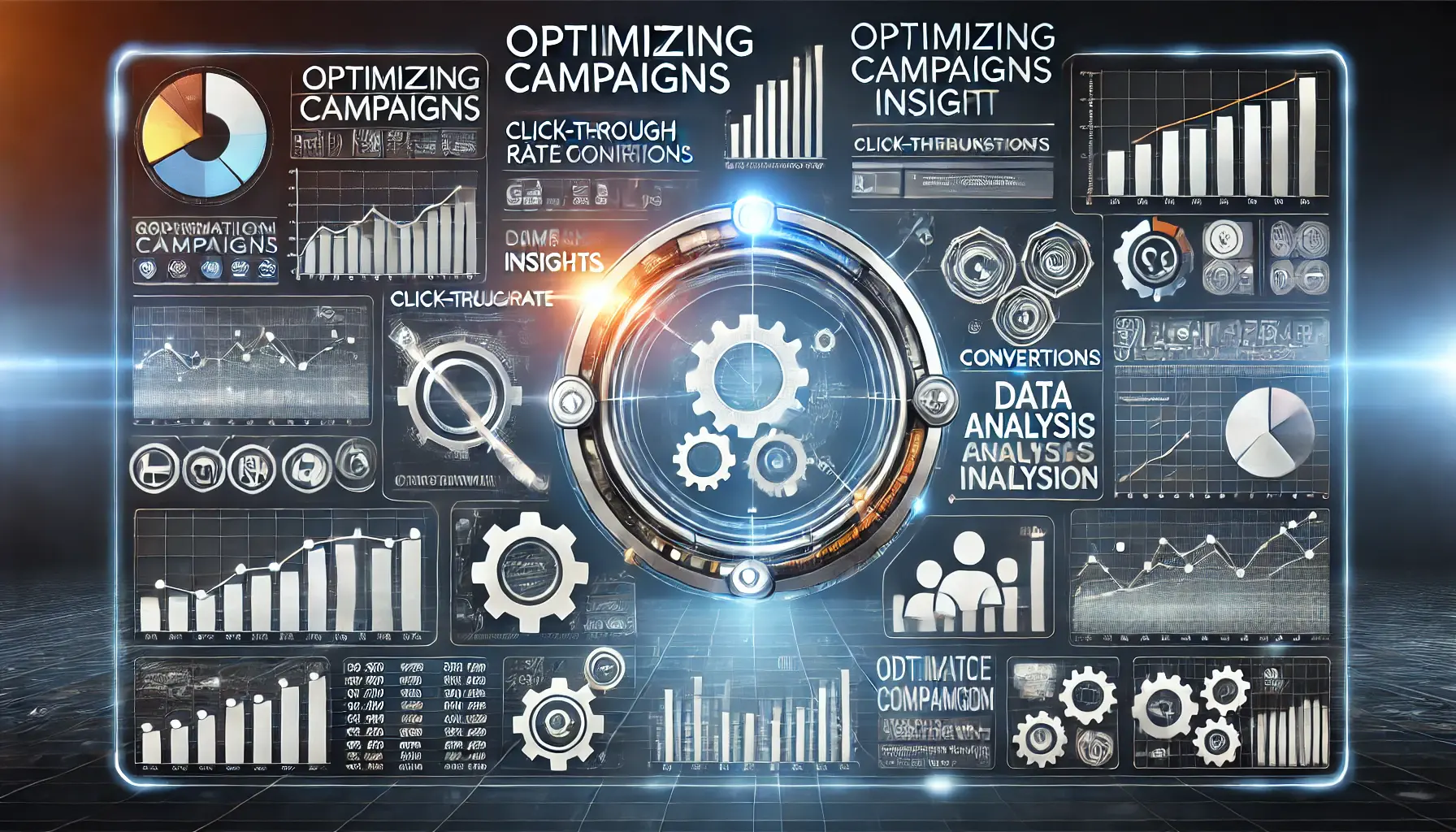
Illustration of optimizing campaigns using data insights and performance analysis tools.
Optimizing Campaigns Based on Data Insights
Optimization is an ongoing process that ensures your campaigns remain effective over time.
Apply your insights to data-driven adjustments, including:
- Refine Targeting: Adjust audience segments based on performance data to better reach highly engaged users.
- Enhance Creative Elements: Experiment with different images, headlines, and interactions to determine what resonates best with your audience.
- Allocate Budget Strategically: Concentrate spending on top-performing channels and ad formats to drive better ROI.
Continuously optimizing your campaigns ensures they align with your marketing objectives and deliver maximum performance.
Measuring success provides the foundation for refining your content synergy efforts.
By monitoring key metrics, analyzing audience behaviors, and optimizing campaigns, you can anticipate better performance and drive sustainable growth.
With these insights, you’re ready to supercharge your Google Display Ads.
- Track CTR, conversion rate, and ROAS to evaluate performance.
- Analyze audience behavior to refine cross-platform engagement strategies.
- Optimize targeting and creative elements for better results.
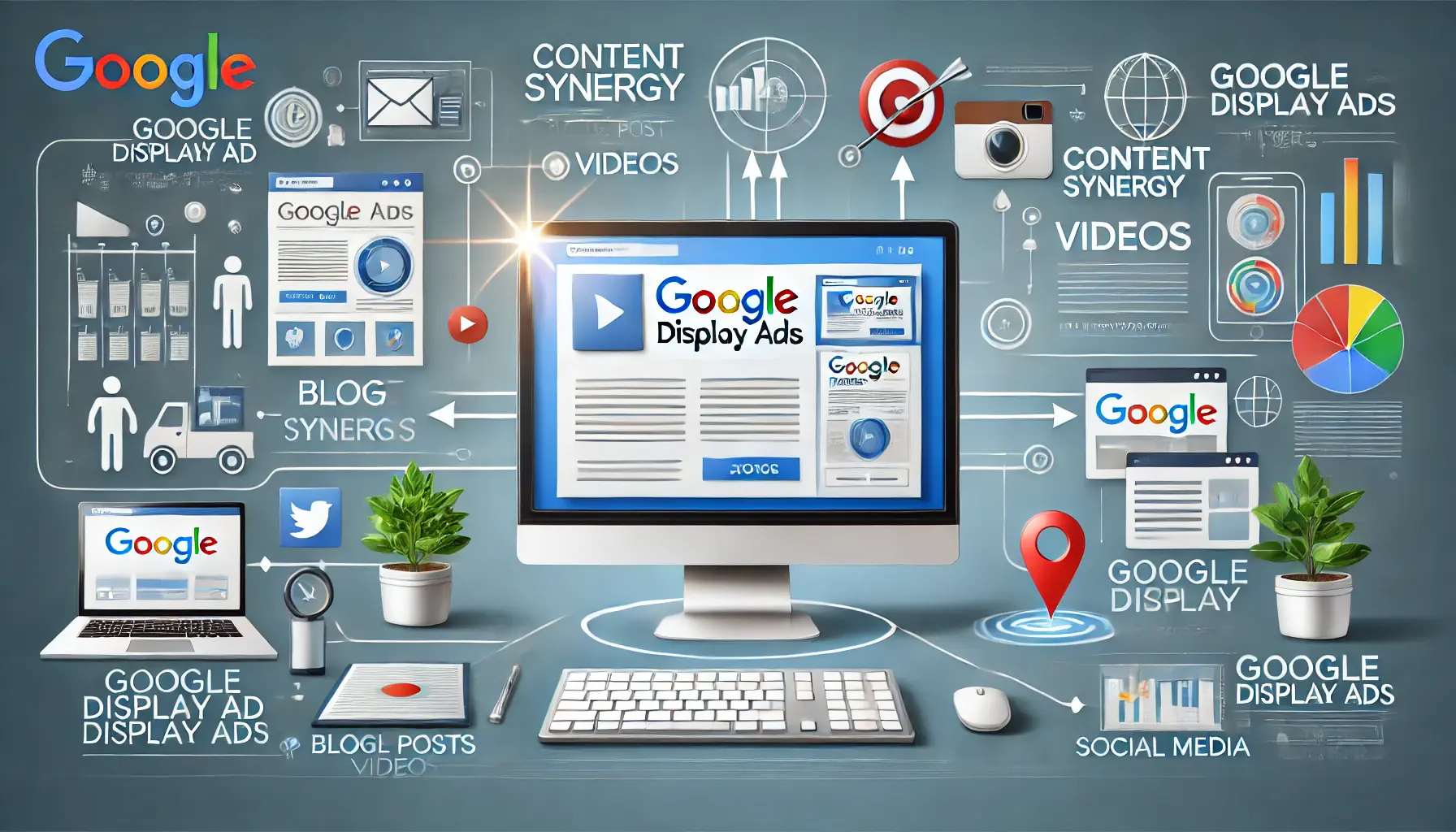
Illustration of successfully combining content synergy with Google Display Ads for effective digital marketing.
How to Be Successful with Content Synergy and Google Display Ads Combined
Successfully leveraging content synergy with Google Display Ads amplifies their power and guides your target audience through an integrated engagement process.
Throughout this article, we have explored key strategies to integrate content and display ads effectively, showcasing how this synergy can boost engagement, drive conversions, and strengthen your brand’s presence across platforms.

Illustration of key takeaways for implementing content synergy in digital marketing strategies.
Key Takeaways for Implementing Content Synergy
Here’s a summary of the essential strategies discussed in this article:
- Understanding Content Synergy: Align your display ad visuals, copy, and targeting strategies with broader content marketing goals to amplify your brand’s voice.
- Leveraging Visual Storytelling: Use compelling visuals and dynamic ads to create emotional connections and memorable experiences for your audience.
- Building Cross-Platform Strategies: Connect Google Display Ads with social media, SEO, and retargeting campaigns to enhance consistency and maximize reach.
- Creating Interactive Ad Formats: Incorporate interactive elements like polls, gamified experiences, and rich media ads to actively engage users.
- Measuring Success: Track metrics like CTR, conversion rates, and engagement rates to evaluate performance, analyze audience behavior, and optimize campaigns for better results.

Illustration of the impact of content synergy on campaign performance with integrated content elements and success metrics.
The Impact of Content Synergy on Your Campaigns
Integrating content synergy into your Google Display Ads campaigns ensures a cohesive approach that resonates with your audience.
By maintaining consistency across platforms and using innovative ad formats, your ads are more likely to cut through the cluttered digital landscape.
Additionally, tailoring campaigns based on audience insights keeps your messaging relevant, fostering stronger relationships and increasing conversion rates.
With careful planning and continuous optimization, content synergy becomes a powerful tool to achieve sustainable growth.

Illustration of moving forward with confidence in the context of digital marketing and growth.
Moving Forward with Confidence
As you apply these strategies, remember that the digital marketing landscape is ever-evolving.
Stay informed about new trends and technologies to keep your campaigns fresh and impactful.
By building a strong foundation in content synergy and embracing innovation, your Google Display Ads will perform exceptionally and elevate your brand to new heights.
By combining creativity, data-driven insights, and strategic planning, you can unlock the full potential of content synergy with Google Display Ads, ensuring long-term success in your digital marketing efforts.
Key strategies include leveraging visual storytelling, integrating cross-platform efforts, and using interactive formats to enhance your content synergy and drive better outcomes.
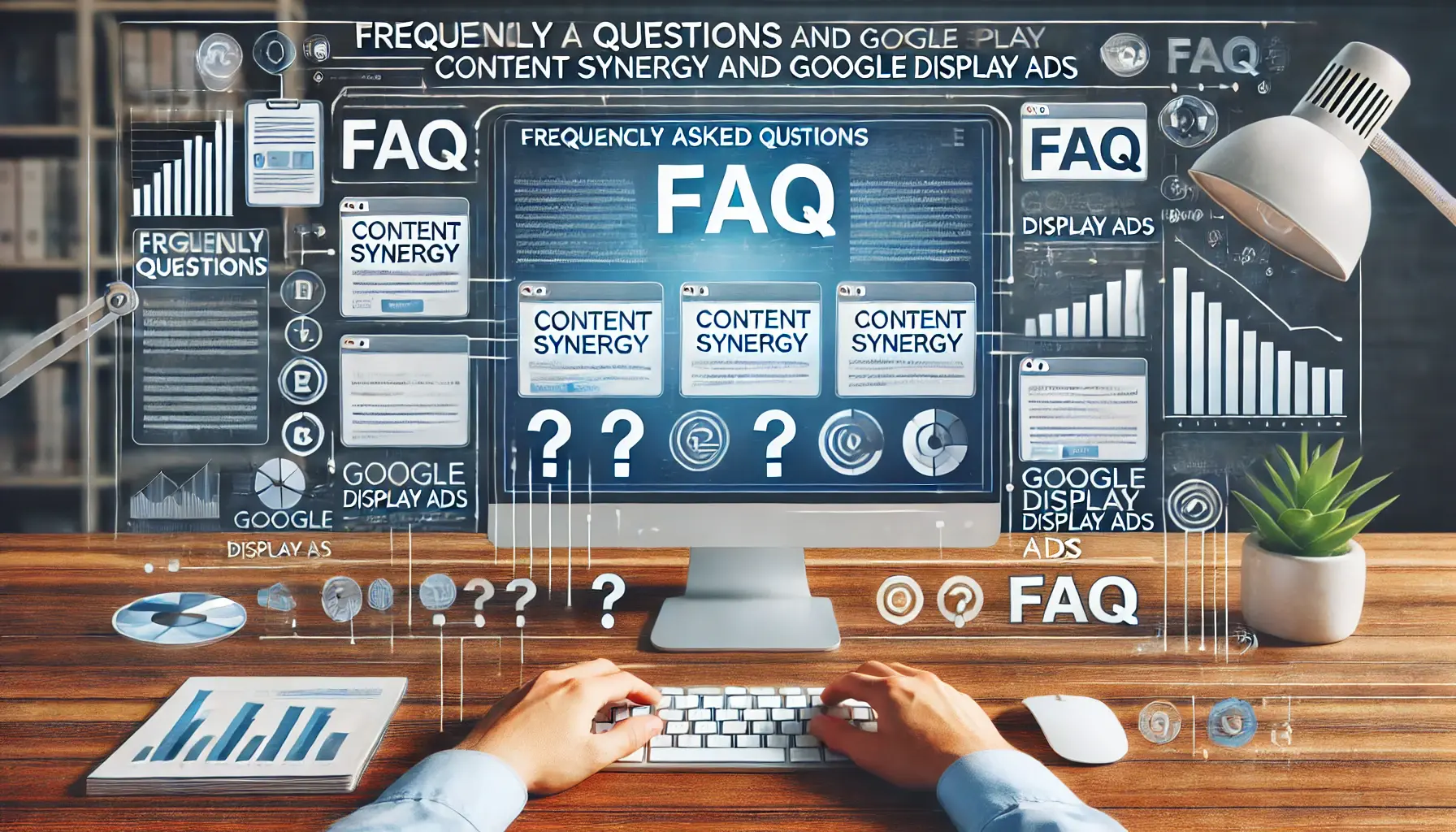
Illustration of frequently asked questions about content synergy and Google Display Ads in a digital workspace.
Your campaigns can be managed by an agency specialized in Google Ads, check out our service page.
Content Synergy and Google Display Ads: Frequently Asked Questions
Common questions and answers that explore how content synergy with Google Display Ads can be maximized for better engagement and overall success in digital marketing campaigns follow.
Content synergy involves aligning various marketing elements, like ads and content, to deliver a cohesive message that amplifies your brand’s voice and enhances audience engagement across multiple platforms.
Google Display Ads enhance content synergy by providing a visual platform to showcase consistent messaging, align with your brand strategy, and target audiences across millions of websites and apps for better reach and engagement.
Interactive ad formats encourage user engagement through dynamic elements like polls, quizzes, videos, and animations.
These formats increase interaction and retention, making your ads more impactful and memorable.
Measuring campaign success helps identify what’s working, optimize future efforts, and ensure your Google Display Ads deliver maximum engagement, conversions, and return on investment (ROI).
Cross-platform strategies ensure consistency by integrating Google Display Ads with social media, SEO, and retargeting campaigns.
This approach broadens reach, reinforces messaging, and improves audience engagement.
Track key metrics like click-through rate (CTR), conversion rate, engagement rate, impression share, and return on ad spend (ROASReturn on Ad Spend, a metric used to measure the revenue generated for every dollar spent on advertising.) to evaluate and optimize your campaigns effectively.
Personalization tailors your ads to audience preferences, behaviors, and demographics, increasing relevance, user engagement, and the probability of conversions.
Yes, it can be integrated by targeting high-intent keywords, promoting optimized content, and driving traffic to ranking pages, thereby helping in better ad performance and improving organic visibility.
Ad campaigns should be optimized regularly based on performance data and audience insights.
Continuous optimization ensures relevance and maximizes your results over time.
